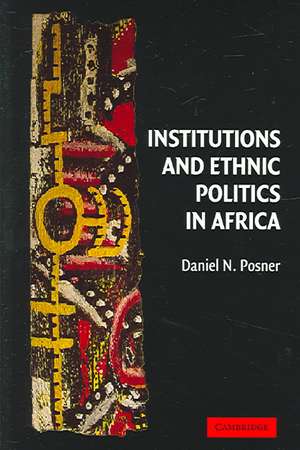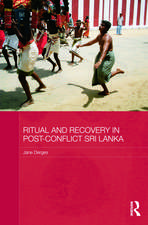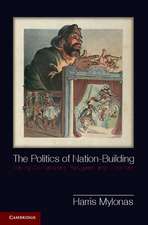Institutions and Ethnic Politics in Africa: Political Economy of Institutions and Decisions
Autor Daniel N. Posneren Limba Engleză Paperback – 5 iun 2005
| Toate formatele și edițiile | Preț | Express |
|---|---|---|
| Paperback (1) | 271.01 lei 6-8 săpt. | |
| Cambridge University Press – 5 iun 2005 | 271.01 lei 6-8 săpt. | |
| Hardback (1) | 505.69 lei 6-8 săpt. | |
| Cambridge University Press – 12 iun 2005 | 505.69 lei 6-8 săpt. |
Din seria Political Economy of Institutions and Decisions
-
 Preț: 133.60 lei
Preț: 133.60 lei -
 Preț: 306.68 lei
Preț: 306.68 lei -
 Preț: 235.99 lei
Preț: 235.99 lei -
 Preț: 200.87 lei
Preț: 200.87 lei -
 Preț: 211.85 lei
Preț: 211.85 lei -
 Preț: 231.82 lei
Preț: 231.82 lei -
 Preț: 295.55 lei
Preț: 295.55 lei -
 Preț: 208.16 lei
Preț: 208.16 lei -
 Preț: 177.53 lei
Preț: 177.53 lei -
 Preț: 226.25 lei
Preț: 226.25 lei -
 Preț: 236.43 lei
Preț: 236.43 lei -
 Preț: 265.11 lei
Preț: 265.11 lei -
 Preț: 228.38 lei
Preț: 228.38 lei -
 Preț: 281.49 lei
Preț: 281.49 lei -
 Preț: 285.37 lei
Preț: 285.37 lei -
 Preț: 279.98 lei
Preț: 279.98 lei - 14%
 Preț: 773.75 lei
Preț: 773.75 lei -
 Preț: 233.38 lei
Preț: 233.38 lei -
 Preț: 247.41 lei
Preț: 247.41 lei -
 Preț: 203.12 lei
Preț: 203.12 lei -
 Preț: 230.33 lei
Preț: 230.33 lei -
 Preț: 286.69 lei
Preț: 286.69 lei - 14%
 Preț: 790.57 lei
Preț: 790.57 lei -
 Preț: 265.32 lei
Preț: 265.32 lei - 11%
 Preț: 554.15 lei
Preț: 554.15 lei -
 Preț: 287.07 lei
Preț: 287.07 lei - 11%
 Preț: 700.20 lei
Preț: 700.20 lei -
 Preț: 273.13 lei
Preț: 273.13 lei -
 Preț: 459.84 lei
Preț: 459.84 lei -
 Preț: 280.35 lei
Preț: 280.35 lei -
 Preț: 260.11 lei
Preț: 260.11 lei - 11%
 Preț: 640.30 lei
Preț: 640.30 lei -
 Preț: 286.89 lei
Preț: 286.89 lei -
 Preț: 247.80 lei
Preț: 247.80 lei - 11%
 Preț: 691.81 lei
Preț: 691.81 lei -
 Preț: 287.48 lei
Preț: 287.48 lei - 11%
 Preț: 641.80 lei
Preț: 641.80 lei - 11%
 Preț: 635.32 lei
Preț: 635.32 lei -
 Preț: 265.70 lei
Preț: 265.70 lei
Preț: 271.01 lei
Nou
Puncte Express: 407
Preț estimativ în valută:
51.86€ • 56.32$ • 43.57£
51.86€ • 56.32$ • 43.57£
Carte tipărită la comandă
Livrare economică 22 aprilie-06 mai
Preluare comenzi: 021 569.72.76
Specificații
ISBN-13: 9780521541794
ISBN-10: 0521541794
Pagini: 360
Ilustrații: 36 b/w illus. 17 tables
Dimensiuni: 152 x 226 x 25 mm
Greutate: 0.48 kg
Ediția:New.
Editura: Cambridge University Press
Colecția Cambridge University Press
Seria Political Economy of Institutions and Decisions
Locul publicării:New York, United States
ISBN-10: 0521541794
Pagini: 360
Ilustrații: 36 b/w illus. 17 tables
Dimensiuni: 152 x 226 x 25 mm
Greutate: 0.48 kg
Ediția:New.
Editura: Cambridge University Press
Colecția Cambridge University Press
Seria Political Economy of Institutions and Decisions
Locul publicării:New York, United States
Cuprins
1. Introduction: institutions and ethnic politics; Part I. Accounting for the Ethnic Cleavage Structure: 2. Accounting for Zambia's ethnic cleavage structure I: the emergence of tribal identities in colonial Northern Rhodesia; 3. Accounting for Zambia's ethnic cleavage structure II: the emergence of language identities in colonial Northern Rhodesia; Part II. Accounting for Ethnic Coalition-Building Choices: 4. Ethnicity and ethnic politics in post-independence Zambia; 5. Explaining changing patterns of ethnic politics; Part III. Testing the Model: 6. Competing explanations; 7. Ethnic campaigning: testing the observable implications of the model for elite behavior; 8. Ethnic voting: testing the observable implications of the model for mass behavior; Part IV. Beyond Zambia: 9. Regime change and ethnic politics in Africa; 10. Beyond regime change, beyond Africa; Appendix A. Native authorities and tribal identifications; Appendix B. Survey and focus group methodologies; Appendix C. Tribal affiliations of parliamentary candidates; Appendix D. Tribal demographies of electoral constituencies.
Recenzii
'… a well-researched, rich, sophisticated and lively analysis of ethnic politics in Zambia. … a fascinating account of changes in the dimensions of ethnic identity in Zambian politics. [Posner's] work is, perhaps, the only book that dwells exclusively on why politicians shift from one ethnic card to another. The details he presents about ethnic and language group formation and about perceptions of ethnic favouritism make the book interesting and a must read.' Journal of Modern African Studies
'Posner's book should still be recognised as an important contribution to understanding the relationship between politics and ethnicity in Africa.' Journal Compilation ASEN
'… well written and well researched. … a good read and will be useful for any graduate class on African politics.' Political Studies Review
'Posner's book should still be recognised as an important contribution to understanding the relationship between politics and ethnicity in Africa.' Journal Compilation ASEN
'… well written and well researched. … a good read and will be useful for any graduate class on African politics.' Political Studies Review
Notă biografică
Descriere
The book demonstrates how formal institutional rules determine the kinds of social cleavages that matter in politics.

















